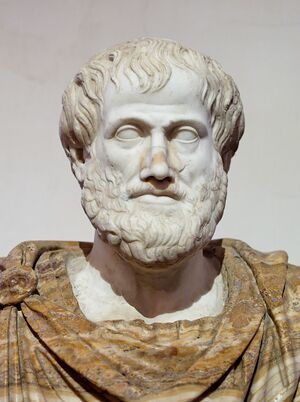Logic (nonfiction): Difference between revisions
Jump to navigation
Jump to search

No edit summary |
|||
| (One intermediate revision by the same user not shown) | |||
| Line 15: | Line 15: | ||
* [[Aristotle]] | * [[Aristotle]] | ||
* [[Evil Balloon Vendor problem]] | |||
* [[Gnomon algorithm]] | * [[Gnomon algorithm]] | ||
* [[Mathematics]] | * [[Mathematics]] | ||
* [[Pachinko logic]] | |||
== Nonfiction cross-reference == | == Nonfiction cross-reference == | ||
| Line 32: | Line 34: | ||
[[Category:Nonfiction (nonfiction)]] | [[Category:Nonfiction (nonfiction)]] | ||
[[Category:Logic (nonfiction)]] | [[Category:Logic (nonfiction)]] | ||
[[Category:Mathematics]] | [[Category:Mathematics (nonfiction)]] | ||
Latest revision as of 05:25, 25 June 2016

Bust of Aristotle. Marble, Roman copy after a Greek bronze original by Lysippos from 330 BC; the alabaster mantle is a modern addition.
Logic (from the Ancient Greek: λογική, logike) is the use and study of valid reasoning.
The study of logic features most prominently in the subjects of philosophy, mathematics, and computer science.
In the West, logic was established as a formal discipline by Aristotle, who gave it a fundamental place in philosophy.
Logic is often divided into three parts, Inductive reasoning, Abductive reasoning, and Deductive reasoning.
In the News
Fiction cross-reference
Nonfiction cross-reference
External links:
- Logic @ wiki.karljones.com